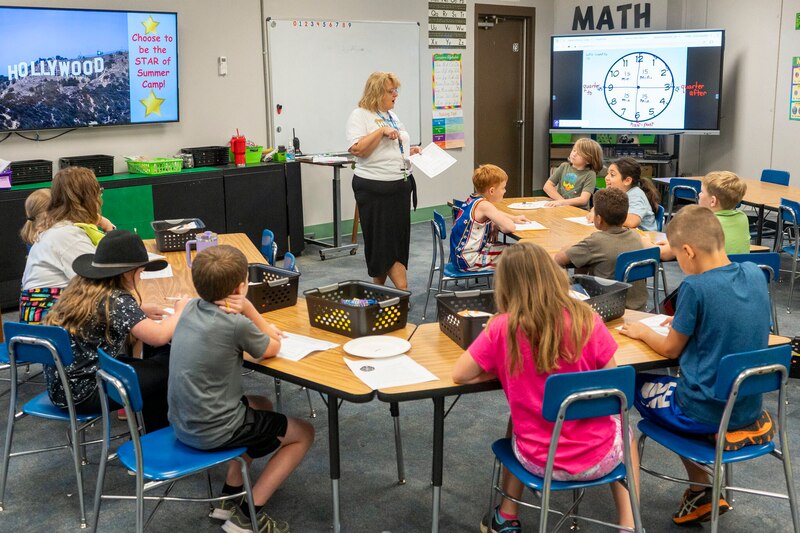Sign up for Chalkbeat Tennessee’s free daily newsletter to keep up with statewide education policy and Memphis-Shelby County Schools.
Tennessee fourth graders showed significant improvement on state tests for English language arts, while third grade scores were mostly steady after achieving historic gains last year, state officials said Thursday.
Fourth-grade proficiency increased by 2.9 percentage points to an overall rate of 46.4%, while third-grade proficiency improved by a half percentage point to 40.9% on tests used by the state to gauge reading levels under the Tennessee Comprehensive Assessment Program, or TCAP.
The rates are the highest since the state raised its academic standards in 2010 after receiving an “F” in 2007 from the U.S. Chamber of Commerce for low academic expectations and for truth in advertising on its K-12 public education performance.
The state education department also reported fewer fourth graders scored “below expectations,” the bottom category for gauging proficiency.
However, the third grade scores put about three-fifths of those students at risk of being held back under Tennessee’s 2021 reading and retention law. Most of them still may advance, however, based on do-over test results and participation in various intervention options.
Last year, of the 60% of third graders who fell short of the state’s proficiency benchmark, only 1.2% were held back due to interventions, exemptions, and an appeals process.
In Memphis-Shelby County Schools, the state’s largest district, officials reported students made gains in both pivotal grades, with the most pronounced improvement by third graders.
ELA proficiency went up 3 percentage points to 26.6% for third graders and by 1.8 percentage points to 28.5% for fourth graders. But new Superintendent Marie Feagins said the improvements weren’t enough.
“Literacy is the anchor to the success that our 110,000 students deserve to experience,” Feagins said in a statement. “Thus, these data further support the need to direct more district resources directly to classrooms, with a target emphasis on a comprehensive literacy approach at every grade level.”
In a news release, Gov. Bill Lee credited the state’s comprehensive literacy strategy, including early investments in tutoring to help struggling readers improve after the pandemic disrupted schooling in 2020. Education Commissioner Lizzette Reynolds praised the hard work of students, educators, and families.
“As we continue our work to ensure that all Tennessee students can read at grade level, we remain committed to supporting teachers and empowering families with multiple pathways to achievement so every student can thrive in their academic journey,” Lee said.
The education department did not publicly release the data behind its report as it usually does. Spokesperson Brian Blackley said it will be published soon but could not give a specific date.
Impacts on retention decisions are uncertain
Data on how many third and fourth graders will be held back as a result of the scoring won’t be released until late summer before school starts, under tougher retention policies approved by the legislature after the pandemic.
“There are a lot of different pathways for student promotion, and some of those haven’t even occurred yet,” Blackley said, citing summer learning programs and third grade TCAP retakes that are still being scored.
A parent, guardian, or educator of a third grader who scored just below proficiency also can submit an appeal to the education department until June 28 based on certain conditions.
For students completing fourth grade who are at risk of retention, the state is to release its calculations by July 1 on whether they showed enough improvement to advance. If not, the parent or guardian must meet with their child’s teacher and principal to make that call. But many educators and parents have already been meeting to discuss those options and make plans.

Low literacy rates have long bedeviled Tennessee
Third grade is considered a critical year for reading, because literacy is foundational to all subsequent learning. But reading scores have historically been mostly stagnant in Tennessee, with only about a third of the state’s third graders meeting the law’s high threshold for proficiency based on state tests.
For several decades, the state tried various strategies to move the needle, and with limited success.
After the pandemic, the state invested $100 million in COVID relief and federal grant funding to provide school systems with optional reading resources and support.
And during a special session called by Lee in 2021 to address pandemic-related learning losses, the legislature passed several laws to jumpstart the state’s literacy work. Among them: prioritizing reading improvements and investments in grades K-3, creating new tutoring and summer school programs, training teachers on the “science of reading,” including an emphasis on phonics, and — most controversial of all — strengthening retention requirements for grades 3 and 4 based on the results of TCAP testing in English language arts.
After getting significant pushback from parents and educators, lawmakers have revised the state’s retention laws several times to allow more students in those grades to advance.
Last month, the governor signed legislation to let each fourth grader’s parents, teacher, and principal decide collectively whether a student should be held back due to a second straight year of low reading scores, even after a year of tutoring.
The department expects to release statewide and district-level TCAP data in all testing subjects by the end of the summer.
Marta Aldrich is a senior correspondent and covers the statehouse for Chalkbeat Tennessee. Contact her at maldrich@chalkbeat.org.






